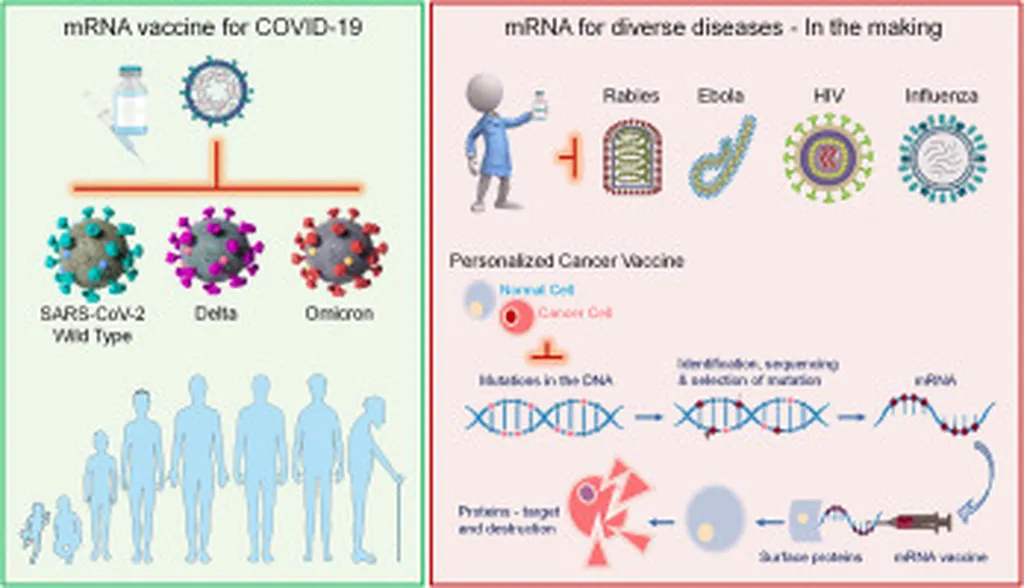In the ever-evolving landscape of the COVID-19 pandemic, researchers are continually seeking innovative solutions to stay ahead of the virus and its variants. A recent study published in the *Iranian Journal of Microbiology* (translated from Persian as “Journal of Microbiology of Iran”) offers a promising avenue in the form of an mRNA vaccine candidate that targets the Receptor Binding Domain (RBD) of both the Delta and Omicron variants of SARS-CoV-2. The lead author, Shahla Shahsavandi from the Razi Vaccine and Serum Research Institute, part of the Agricultural Research Education and Extension Organization in Karaj, Iran, and her team have made significant strides in this area.
The study focuses on the development of an mRNA vaccine that encodes a chimera of the RBD from both the Delta and Omicron variants. This approach aims to address the challenge posed by the frequent mutations in the viral genome, which have diminished the effectiveness of current vaccines. “The emergence of new variants has highlighted the need for vaccines that can elicit a robust immune response against multiple variants,” Shahsavandi explained.
The researchers evaluated the uptake of mRNA-lipid nanoparticles (LNPs) into human monocyte-derived dendritic cells by measuring the intensity of enhanced eGFP expression in the transfected cells. They then assessed the effect of these mRNA-LNPs on immune response induction in mice following a prime-boost immunization strategy, along with analyzing cytokine release. The safety of the vaccine candidate was also examined through pyrogenicity and toxicity assays.
The results were promising. Upon intramuscular injection of mice, the vaccine candidate induced potent antibodies specific to the viral S protein, robust Th1-biased cell-mediated immunity, and enhanced IFN-γ expression. These observations indicate that the mRNA-LNP was taken up and migrated to the lymph nodes. Furthermore, the vaccine candidate did not cause inflammation or local reactions after injection, as confirmed by biochemical, hematological, and histopathological examinations.
The implications of this research are significant. The ability of the mRNA vaccine candidate to target immune cells suggests that it could potentially improve immune responses against circulating or emerging variants. This could be a game-changer in the fight against COVID-19, particularly as new variants continue to emerge.
For the energy sector, the development of effective vaccines has a direct impact on workforce health and productivity. A healthier workforce means fewer disruptions and increased efficiency, which are crucial for maintaining operations and productivity. Additionally, the economic stability brought about by effective pandemic control can lead to increased investment and growth in the energy sector.
As Shahsavandi noted, “Our findings suggest that this mRNA vaccine candidate has the potential to be a valuable tool in the ongoing battle against COVID-19. It could help us stay ahead of the virus and its variants, ensuring better protection for populations worldwide.”
This research not only advances our understanding of mRNA vaccines but also paves the way for future developments in the field. As we continue to grapple with the challenges posed by the pandemic, innovative solutions like this one offer hope for a safer and healthier future. The study’s publication in the *Iranian Journal of Microbiology* underscores the global effort and collaboration in the fight against COVID-19, highlighting the importance of international research efforts in addressing global health challenges.

